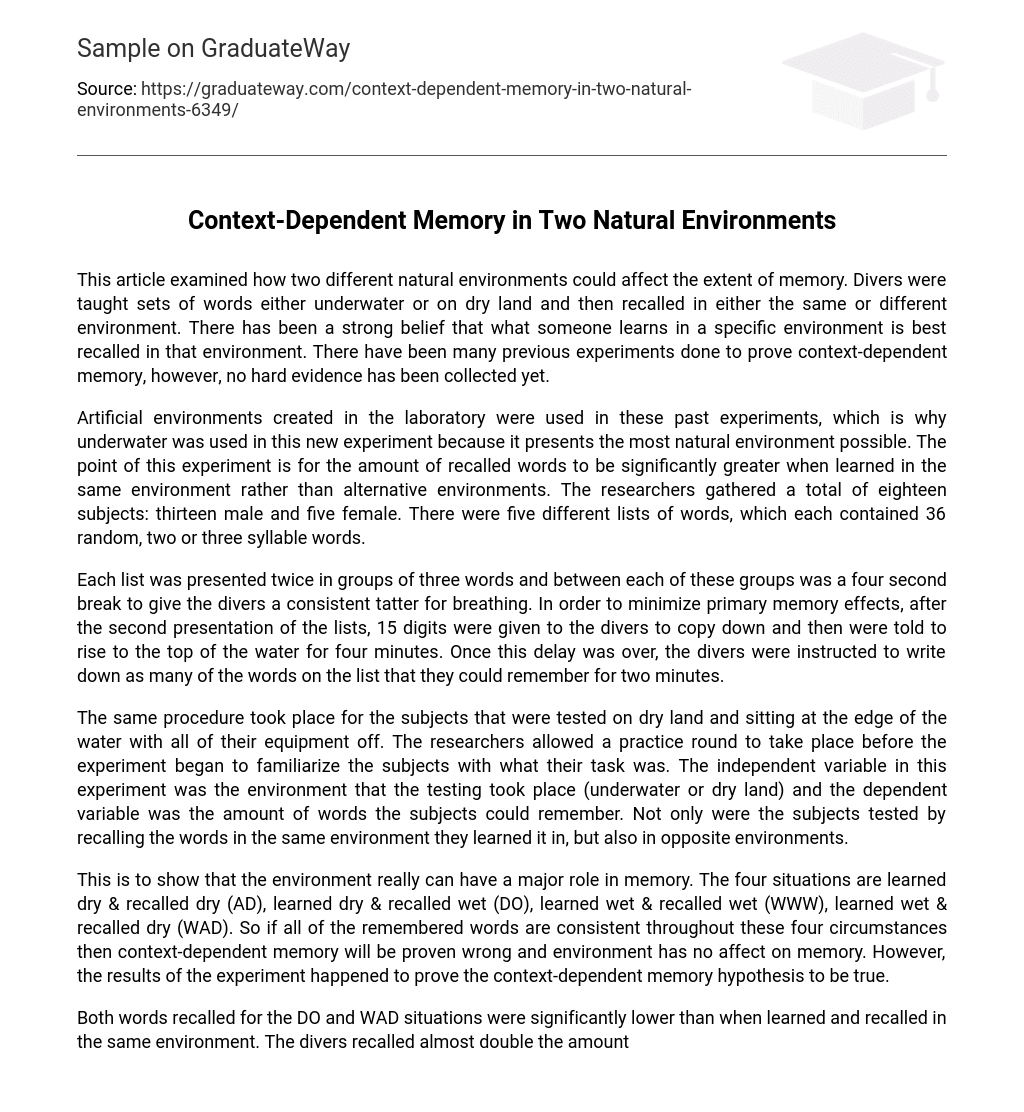This article examined how two different natural environments could affect the extent of memory. Divers were taught sets of words either underwater or on dry land and then recalled in either the same or different environment. There has been a strong belief that what someone learns in a specific environment is best recalled in that environment. There have been many previous experiments done to prove context-dependent memory, however, no hard evidence has been collected yet.
Artificial environments created in the laboratory were used in these past experiments, which is why underwater was used in this new experiment because it presents the most natural environment possible. The point of this experiment is for the amount of recalled words to be significantly greater when learned in the same environment rather than alternative environments. The researchers gathered a total of eighteen subjects: thirteen male and five female. There were five different lists of words, which each contained 36 random, two or three syllable words.
Each list was presented twice in groups of three words and between each of these groups was a four second break to give the divers a consistent tatter for breathing. In order to minimize primary memory effects, after the second presentation of the lists, 15 digits were given to the divers to copy down and then were told to rise to the top of the water for four minutes. Once this delay was over, the divers were instructed to write down as many of the words on the list that they could remember for two minutes.
The same procedure took place for the subjects that were tested on dry land and sitting at the edge of the water with all of their equipment off. The researchers allowed a practice round to take place before the experiment began to familiarize the subjects with what their task was. The independent variable in this experiment was the environment that the testing took place (underwater or dry land) and the dependent variable was the amount of words the subjects could remember. Not only were the subjects tested by recalling the words in the same environment they learned it in, but also in opposite environments.
This is to show that the environment really can have a major role in memory. The four situations are learned dry & recalled dry (AD), learned dry & recalled wet (DO), learned wet & recalled wet (WWW), learned wet & recalled dry (WAD). So if all of the remembered words are consistent throughout these four circumstances then context-dependent memory will be proven wrong and environment has no affect on memory. However, the results of the experiment happened to prove the context-dependent memory hypothesis to be true.
Both words recalled for the DO and WAD situations were significantly lower than when learned and recalled in the same environment. The divers recalled almost double the amount of words in the same environment Context-Dependent Memory in Two Natural Environments: On Land and Underwater By colonel words between the AD and WWW, or the WAD and DO conditions. This shows that the specific environment is not necessarily important but Just the fact that the words were learned and recalled in the same environment is.
There were some possible errors that were brought up during the experiment. Some of these were that the time of day was not always the same, the locations were not always kept constant, and the researchers had no control over local conditions, such as the weather. However, the biggest error was that the context-dependent effects were not because of environmental change, but because of disruption during the movement from one environment to the next. In order to test this, the researchers put together one other experiment.
This experiment consisted of comparing the original AD condition with a new AD condition where the subjects must dive into the water during the four-minute delay between the presentations of the words. The same amount of subjects and the equipment used were kept the same. Also, the subjects also got a practice round before the actual testing began Just like in experiment l. If the words recalled were considerably lower then it proves that the disruption hypothesis is correct. However, the amount of words recalled by the objects did not decrease from the old condition to the new condition.
This proves that disruption was not a factor in the previous experiment and did not have an effect on memory. Both of these experiments together provide the empirical evidence that was not originally there from previous experiments. The amount of words recalled in one environment truly depends on what environment the words were learned in and disruption has no effect. Because these results were collected in natural environments rather than simulated laboratory conditions it makes the evidence and results more reliable.





